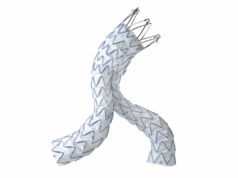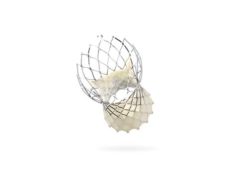
New data presented at 2018 Transcatheter Cardiovascular Therapeutics (TCT) meeting (21–25 September, San Diego, USA), according to a press release, patients implanted with the CoreValve transcatheter aortic valve implantation (TAVI) system (Medtronic) experienced excellent valve durability out to five years with low severe haemodynamic structural valve deterioration (0.8%) compared to patients who received a surgical aortic valve replacement (1.8%). The data were from CoreValve US High-Risk trial, which represent the longest-term follow-up data ever presented from the study.
The press release also reports that of the 750 patients (391 TAVI; 359 SAVR) followed out to five years, patients treated with the CoreValve system showed similar outcomes compared to surgery for the primary endpoint of all-cause mortality 55.3% vs. 55.4%; p=0.50). Additionally, rates were similar for major stroke (12.3% vs. 13.2%; p=0.49) at five years.
Thomas G Gleason (University of Pittsburgh School of Medicine, Pittsburgh, USA), who presented the results of study at TCT, comments: “These were early CoreValve patients, some of the first patients to receive the therapy, and it is reassuring to see that the CoreValve system has proven to be durable out to five years. As the technology and heart team experience continues to improve, this longer-term follow-up data is an encouraging indicator for TAVI patients in the future. Earlier concerns regarding the durability of TAVI are certainly tempered by these mid-term data.”
Additionally, the complete two-year data from the global, prospective, multicentre, randomised SURTAVI trial showed the Medtronic self-expanding TAVI platform was similar to surgery for the primary endpoint of all-cause mortality or disabling stroke at two years, confirming what the Bayesian statistical analysis demonstrated at the 2017 American College of Cardiology (ACC) meeting. The study evaluated the CoreValve and CoreValve Evolut R systems in intermediate-risk aortic stenosis patients vs. open-heart surgery at two years.
The full two-year data set confirmed that rates of all-cause mortality or disabling stroke at two years were similar to surgery. The TAVI procedure also demonstrated significantly better mean aortic valve gradient compared to surgery at two years. Patients treated with TAVI experienced statistically lower rates of stroke, lower rates of new onset atrial fibrillation, a quicker hospital discharge, less acute kidney injury and fewer transfusions. Surgery patients experienced fewer permanent pacemaker implantations and less aortic regurgitation.
Jeffrey J Popma (Beth Israel Deaconess Medical Center, Boston, USA), principal investigator of the SURTAVI trial, comments: “The excellent outcomes from this study tell us two important things: first, we can be confident that TAVI performs well in the intermediate-risk patient population, and secondly, the Bayesian statistical analysis that allowed us to evaluate these data more than a year early, is a reliable methodology that we can trust and use in future studies.”











